【考前最后一战】2022中考英语冲刺复习课件
文档属性
| 名称 | 【考前最后一战】2022中考英语冲刺复习课件 |  | |
| 格式 | zip | ||
| 文件大小 | 76.3KB | ||
| 资源类型 | 试卷 | ||
| 版本资源 | 牛津上海版(试用本) | ||
| 科目 | 英语 | ||
| 更新时间 | 2022-07-01 14:58:37 | ||
图片预览

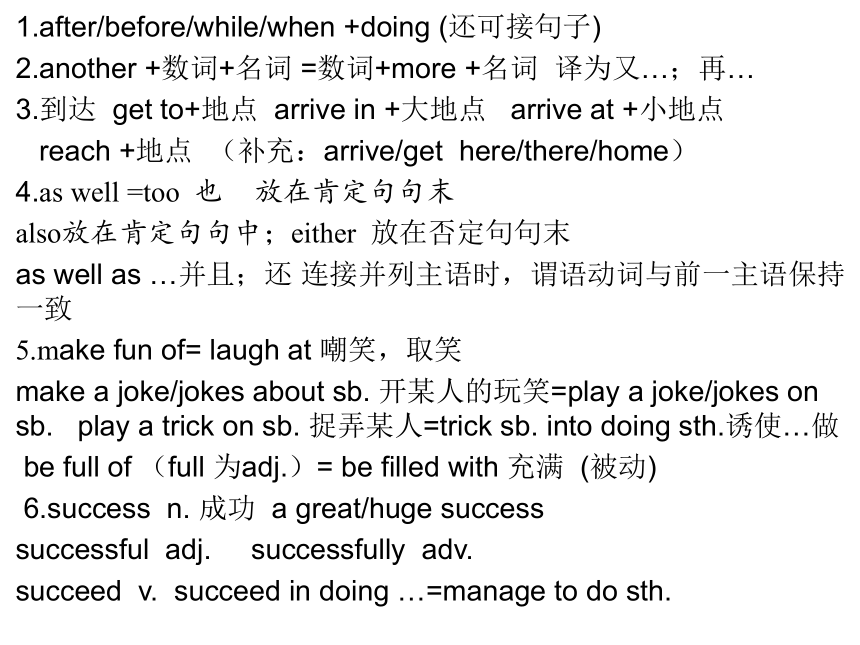
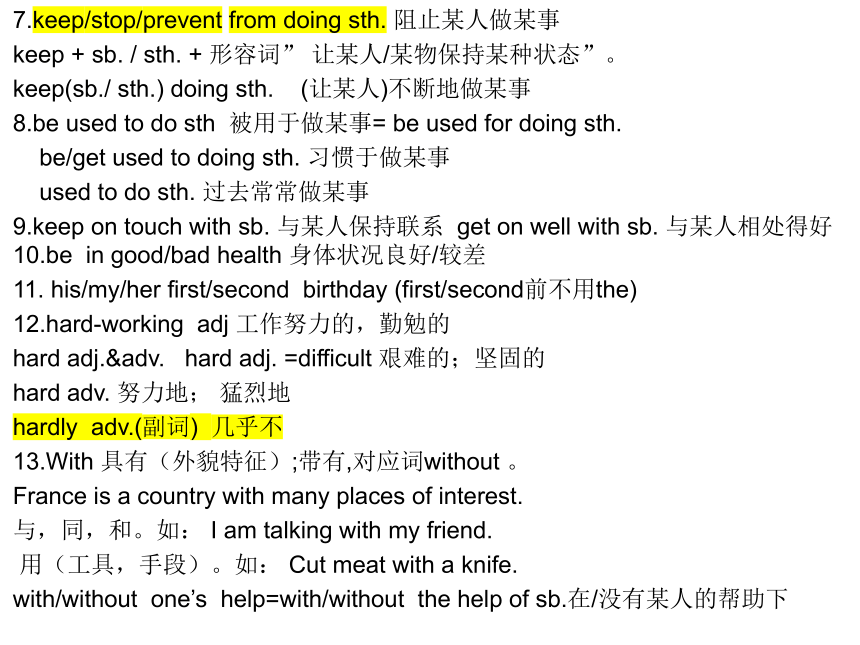
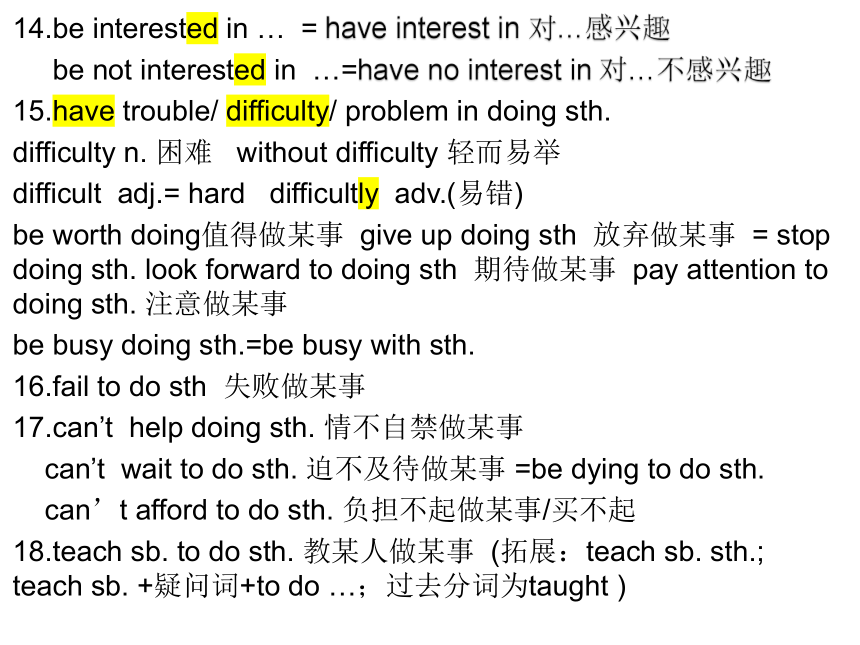
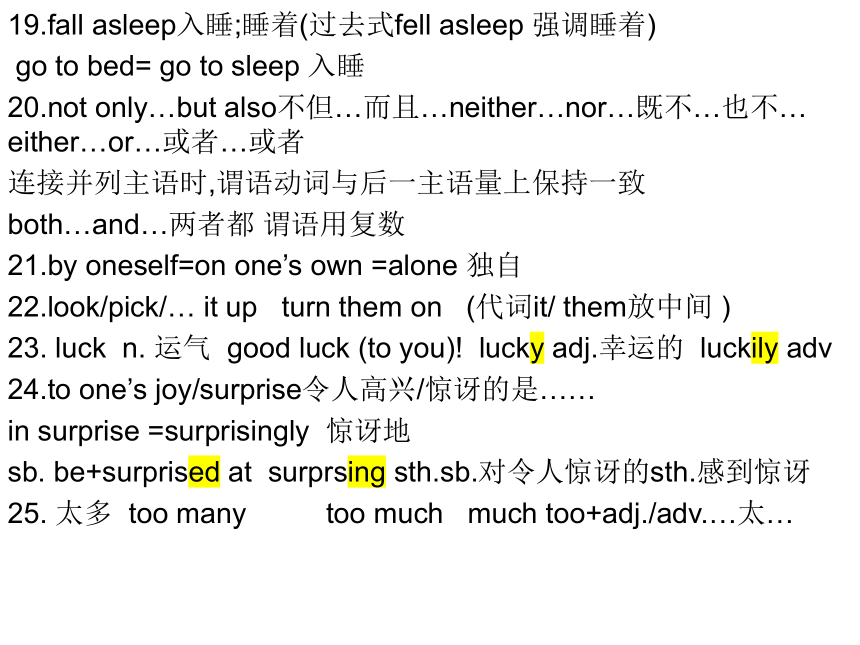

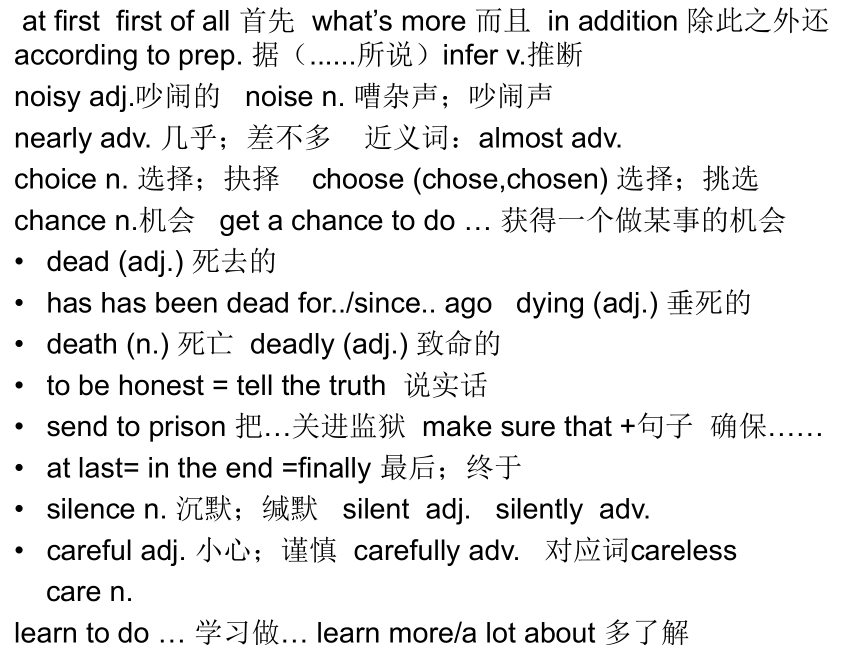
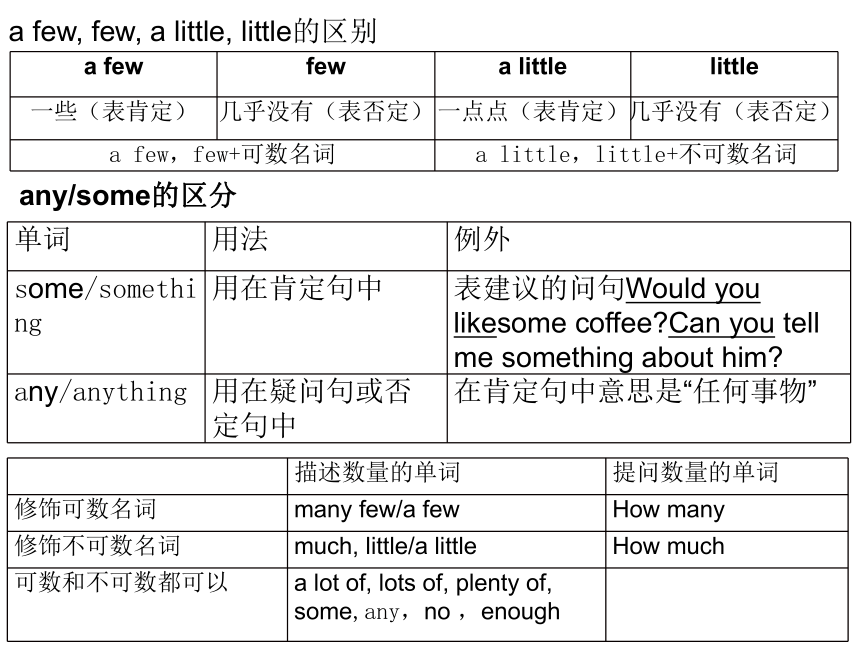
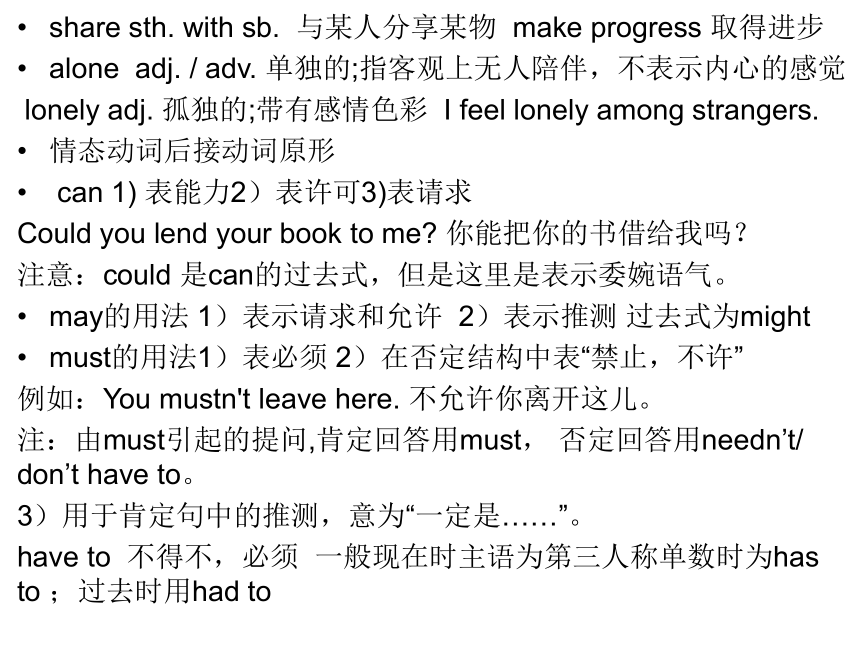
文档简介
(共22张PPT)
The last fight before exam
Good luck to everyone!
1.after/before/while/when +doing (还可接句子)
2.another +数词+名词 =数词+more +名词 译为又…;再…
3.到达 get to+地点 arrive in +大地点 arrive at +小地点
reach +地点 (补充:arrive/get here/there/home)
4.as well =too 也 放在肯定句句末
also放在肯定句句中;either 放在否定句句末
as well as …并且;还 连接并列主语时,谓语动词与前一主语保持一致
5.make fun of= laugh at 嘲笑,取笑
make a joke/jokes about sb. 开某人的玩笑=play a joke/jokes on sb. play a trick on sb. 捉弄某人=trick sb. into doing sth.诱使…做
be full of (full 为adj.)= be filled with 充满 (被动)
6.success n. 成功 a great/huge success
successful adj. successfully adv.
succeed v. succeed in doing …=manage to do sth.
7.keep/stop/prevent from doing sth. 阻止某人做某事
keep + sb. / sth. + 形容词” 让某人/某物保持某种状态”。
keep(sb./ sth.) doing sth. (让某人)不断地做某事
8.be used to do sth 被用于做某事= be used for doing sth.
be/get used to doing sth. 习惯于做某事
used to do sth. 过去常常做某事
9.keep on touch with sb. 与某人保持联系 get on well with sb. 与某人相处得好10.be in good/bad health 身体状况良好/较差
11. his/my/her first/second birthday (first/second前不用the)
12.hard-working adj 工作努力的,勤勉的
hard adj.&adv. hard adj. =difficult 艰难的;坚固的
hard adv. 努力地; 猛烈地
hardly adv.(副词) 几乎不
13.With 具有(外貌特征);带有,对应词without 。
France is a country with many places of interest.
与,同,和。如: I am talking with my friend.
用(工具,手段)。如: Cut meat with a knife.
with/without one’s help=with/without the help of sb.在/没有某人的帮助下
14.be interested in … = have interest in 对…感兴趣
be not interested in …=have no interest in 对…不感兴趣
15.have trouble/ difficulty/ problem in doing sth.
difficulty n. 困难 without difficulty 轻而易举
difficult adj.= hard difficultly adv.(易错)
be worth doing值得做某事 give up doing sth 放弃做某事 = stop doing sth. look forward to doing sth 期待做某事 pay attention to doing sth. 注意做某事
be busy doing sth.=be busy with sth.
16.fail to do sth 失败做某事
17.can’t help doing sth. 情不自禁做某事
can’t wait to do sth. 迫不及待做某事 =be dying to do sth.
can’t afford to do sth. 负担不起做某事/买不起
18.teach sb. to do sth. 教某人做某事 (拓展:teach sb. sth.; teach sb. +疑问词+to do …;过去分词为taught )
19.fall asleep入睡;睡着(过去式fell asleep 强调睡着)
go to bed= go to sleep 入睡
20.not only…but also不但…而且…neither…nor…既不…也不… either…or…或者…或者
连接并列主语时,谓语动词与后一主语量上保持一致
both…and…两者都 谓语用复数
21.by oneself=on one’s own =alone 独自
22.look/pick/… it up turn them on (代词it/ them放中间 )
23. luck n. 运气 good luck (to you)! lucky adj.幸运的 luckily adv
24.to one’s joy/surprise令人高兴/惊讶的是……
in surprise =surprisingly 惊讶地
sb. be+surprised at surprsing sth.sb.对令人惊讶的sth.感到惊讶
25. 太多 too many too much much too+adj./adv.…太…
take place = happen 发生 无被动
have/has been to 去过某地 have/has gone to 去某地了
improve=make better 改善;提高 make progress 取得进步
health(健康)n.+y=healthy(健康的)adj.
keep/stay healthy/fit保持健康 live/lead a balanced life
have a balanced diet 有着均衡的饮食
be good/bad for our health 对我们的健康有好/坏处
get/be ready for 为......做好准备, be ready 准备好的.....
be ready to do sth 准备做某事
prepare for 准备 be prepared to do sth.愿意做某事
in danger in need in trouble .in fear in silence
take action 采取行动 make a difference 有作用
be different from 与……不同 the same as… 和……一样
later adv. 以后;后来 late 迟的;晚的 lately=recently 最近;近来
in one’s opinion 在某人看来=as far as I am concerned
at first first of all 首先 what’s more 而且 in addition 除此之外还 according to prep. 据(......所说)infer v.推断
noisy adj.吵闹的 noise n. 嘈杂声;吵闹声
nearly adv. 几乎;差不多 近义词:almost adv.
choice n. 选择;抉择 choose (chose,chosen) 选择;挑选
chance n.机会 get a chance to do … 获得一个做某事的机会
dead (adj.) 死去的
has has been dead for../since.. ago dying (adj.) 垂死的
death (n.) 死亡 deadly (adj.) 致命的
to be honest = tell the truth 说实话
send to prison 把…关进监狱 make sure that +句子 确保……
at last= in the end =finally 最后;终于
silence n. 沉默;缄默 silent adj. silently adv.
careful adj. 小心;谨慎 carefully adv. 对应词careless
care n.
learn to do … 学习做… learn more/a lot about 多了解
learn from…向…学习
a few, few, a little, little的区别
a few few a little little
一些(表肯定) 几乎没有(表否定) 一点点(表肯定) 几乎没有(表否定)
a few,few+可数名词 a little,little+不可数名词 any/some的区分
单词 用法 例外
some/something 用在肯定句中 表建议的问句Would you likesome coffee Can you tell me something about him
any/anything 用在疑问句或否定句中 在肯定句中意思是“任何事物”
描述数量的单词 提问数量的单词
修饰可数名词 many few/a few How many
修饰不可数名词 much, little/a little How much
可数和不可数都可以 a lot of, lots of, plenty of, some,any,no ,enough
share sth. with sb. 与某人分享某物 make progress 取得进步
alone adj. / adv. 单独的;指客观上无人陪伴,不表示内心的感觉
lonely adj. 孤独的;带有感彩 I feel lonely among strangers.
情态动词后接动词原形
can 1) 表能力2)表许可3)表请求
Could you lend your book to me 你能把你的书借给我吗?
注意:could 是can的过去式,但是这里是表示委婉语气。
may的用法 1)表示请求和允许 2)表示推测 过去式为might
must的用法1)表必须 2)在否定结构中表“禁止,不许”
例如:You mustn't leave here. 不允许你离开这儿。
注:由must引起的提问,肯定回答用must, 否定回答用needn’t/ don’t have to。
3)用于肯定句中的推测,意为“一定是……”。
have to 不得不,必须 一般现在时主语为第三人称单数时为has to ;过去时用had to
祈使句:肯定形式 1)be/+形容词 / 名词 2)Do +sth
否定形式 1)Don’t be +其他成分 [形容词、名词或介词短语] )
2)Don’t do +sth
感叹句:What+(a / an)+形容词+名词+(主语+谓语)!
What+形容词+名词复数+(主语+谓语)!
What+形容词+不可数名词+(主语+谓语)!
常见不可数名词:work weather,advice information news food
How+形容词/副词+(主语+谓语)!
时间状语从句:1.when引导的从句的谓语动词可以是延续性的动词,又可以是瞬时动词
When she came in, I was eating.
2、while引导的从句的谓语动作必须是延续性的,并强调主句和从句的动作同时发生(或者相对应)。并且while有时还可以表示对比。While my wife was reading the newspaper, I was watching TV.
被动语态:一般现在时 am/is/ are done
一般过去时 was/ were done
一般将来时 will/be going to be done
带有情态动词的被动语态 can/should/must/… +be done
现在完成时的被动语态:have/ has been+过去分词
宾语从句:充当主句中谓语动词的宾语的句子(位于动词/形容词/介词之后)
三要素:1. 宾语从句的引导词有 that ( 可省略),if / whether (是否), what,who , where,how,why, when 等等
if 与whether (是否) 的区别: 以下三情况用whether
1)whether ….后+ or not. 2)介词后+ whether 3)Whether to do
2.陈述语序:引导词+主语+谓语
3. 时态:主现从不限 主过从过 从句真理永从现。
注:根据空格可考虑简化。
后接动名词(动词原形+ing)的动词词组
finish doing sth. mind doing sth. 介意做某事
enjoy/like/love doing sth. spend time/ money (in) doing sth. practise doing sth. suggest doing sth avoid doing sth. imagine doing sth. instead of doing sth. 代替做某事
can‘t stand doing sth. 不能忍受做某事 without doing sth.
非特指(无范围) :other adj./pron. 其他的+表示人或物的名词
others pron. 其他的人或物= other +名词复数
特指 (有范围) the other 其他的/另一 +表示人或物的名词复数或单数 the others 其他的人或物= the other +名词复数
后有名不S 后面无名词则S
One…, the other … 一个…;另一个…(用于两者之间)
another 另一个 用于三者或三者以上
Would you like another cup of tea
She has two sons. One is in America, and the other lives with her.
Some like singing, others prefer dancing.
Do you read any other novels
后接动词不定式(to do sth)的动词词组
decide (not)to do sth 决定(不)去做某事
want to do sth = would like to do sth = feel like doing sth
hope to do sth 希望做某事 hope that + 宾从 希望某事……
plan to do sth 计划去做某事 agree to do sth. 同意做某事
choose to do sth. 选择做某事
expect to do sth. 期望做某事
offer to do sth. 提出做某事;主动做某事
offer sth to sb. = offer sb. sth.为某人提供某物
近义词:provide sth for sb.= provide sb. with sth.
后接宾语+ 不定式的动词词组
tell sb./(not) to do sth 告诉某人(不)做某事
ask sb to do sth 叫某人(不)去做某事
advise sb. to do sth. 建议某人做某事
allow sb. to do sth. 允许某人做某事
encourage sb. to do sth 鼓励某人做某事
order sb. to do sth. 命令某人做某事
remind sb. to do sth. 提醒某人做某事 近:remind sb. of/ about sth. remind sb. of sth. 使某人想起某事
warn sb. to do sth. 警告某人做某事
invite sb. to do sth. 邀请某人做某事
be worried about … =worry about …
be late for school 上学迟到
on one’s way to … 在去往某地的路上
by the way 顺便问一下 in a way 在某种程度上
后接动词原形的结构
let sb do sth 让某人做某事
make sb do sth 让某人做某事
have sb do sth 让某人做某事
help sb do sth= help sb with sth 帮助某人做某事
why not do sth 为什么不做某事 = why don’t you do sth.
would you please do sth. 请您做……..
had better (not)do sth 最好(不)做某事
类似结构:
remember doing sth 记得做过… remember to do sth 记得去做… forget doing sth 忘记做过某事 forget to do sth 忘记去做某事
regret doing sth. 后悔做过某事 regret to do sth. 后悔未做某事
stop doing sth 停止做某事 stop to do sth 停下来去做另外一件事
go on doing sth. = continue doing sth. 继续做某事 (同一件事) go on to do sth = continue to do sth. 继续做某事 (其他事情)
try doing sth. 尝试做某事
try to do sth.=try/do one’s best to do sth. 努力做某事
mean doing sth. 意味着…… mean to do sth. 打算做某事
manage to do sth. 设法完成某事= succeed in doing sth.
see sb doing sth 看见某人正在做某事 (正在做)
see sb do sth 看见某人经常做某事、做了某事 (全过程)
hear sb doing sth 听见某人正在做某事 (正在做)
hear sb do sth 听见某人经常做某事、做了某事 (全过程)
prefer to do… 更喜欢做…
prefer to do A rather than do B宁愿做A不宁愿做B
= prefer doing A to doing B = would rather do A than do B
between一般指两者之间;among指三个或三个以上之间。
in front of →(反) behind ,表示“在……外部的前面”
in the front of →(反) at the back of ,表示“在……内部的前面”
beside = next to(在…旁边;紧挨)
at 用于小地方(如车站、学校等。)如: at the station.
也可用于门牌号码前。 如: at 115 Zhongshan Road.
in用于大地方(如国家,城市等。)on用于具体某一天或 某一天的上/下午/晚上 on the second night 在第二天晚上
be made of 从产品中能看出原材料be made from从产品中看不出原材料 be made up of 由…组成
million 百万,表示具体的数目时用单数形式;表示不确定的数目时用复数形式,且与of 连用,构成短语millions of,意为“大量的;数以百万计的”。(hundred,thousand,billion用法相同)
加to do 不定式的句型结构
It’s time (for sb) to do sth. 做某事的时间到了
It takes sb. some time to do sth. 做某事花了某人多长时间
It’s + adj. for/of sb. to do sth. 做某事对于某人来说是……
(adj.修饰事物的特征用for;adj.修饰人的内在品质或性格特点用of)
be(not) adj. enough to do 做某事(不) 够…
too +adj./adv. to do… 太…而不能做某事
sb. is ready to do sth. 某人准备好做某事
sb. is able to do sth某人能够做某事= sb. have ability to do sth. = sb. can do sth
sb. is afraid to do sth某人害怕做某事
It seem(s) +adj.to do sth 做某事似乎… =It appear(s) to do sth.
find it … to do sth 觉得做某事是…的
形容词副词的比较等级句型
as +adj./adv. as … …和…一样地… (用adj.or adv.取决于第一个as 前面的词)
not so/as +adj./adv. as … …不如…
和……一样多的…as many + 复数名词+as
as much +不可数名词+as”
as + adj./adv.+ as sb. can/could /possible 某人尽可能..
the + 比较级, the + 比较级 越…,越…
比较级+ and + 比较级 越来越…
the taller of the two boys 两个男孩中个子较高的那个
修饰比较级的词: much far a lot a little a bit even …
倍数 + 比较级 + than …
定语从句:在复合句中,修饰某一 名词 或 代词 的 从句
构成:先行词+关系代/副词+句子
先行词(人)+who/that 先行词(物)+which /that
take care of = look after=care for 照顾 (care about 关心;在意 careful adj. carefully adv.)
take good care of = look after well 细心照料
不定冠词a/an,用在单数可数名词前,表示“一个/件/…”的意义
a用于辅音音素开头的单词前,an用于元音音素开头的单词前。
a useful book, a European country, a university an honest boy, an hour, an ugly girl, an eight/ eleven-year-old boy an umbrella
定冠词(the):表示特指的人或事物,与单数或复数可数名词或不可数名词连用。
用法:(1)特指某(些)人或某(些)物。The gentleman in brown
(2)用在说话双方都知道的人或事物前。如: Would you please open the door
(3)用在前文提到过的人或事物。如: I have a new book. The book is……
(4)用在世界上独一无二的事物前。如:the Earth the sea the sky
(5)用在形容词最高级、序数词及only(作形容词)前。
(6)用在江、河、海洋、海峡、群岛、山系等专有名词前。the Yangtze River (7)用在西洋乐器前。如:the piano/ violin/ guitar
(8)用在一些表示方向、方位、时间、场所的固定词组中
on the right/ left in the east in the morning/ afternoon/ evening
(9)用在姓氏的复数形式前,表示“全家人”。
零冠词(/)用法:
1、在日期、月份、节日等名词前不加the。如: 10 September is Teachers' Day.
2、复数可数名词和不可数名词前不加the表示泛指。
Camels are very useful animals in the desert.
3、学科、语言前不加the。 Can you speak English
4、球类、棋类、牌类运动或游戏前不加the。
A lot of people enjoy playing football/ soccer/basketball/ volleyball/ chess/ bridge
5、表示“用餐”时,一日三餐前不加the。
动词的过去式和过去分词:
hold-held-held bulid-built-built write-wrote-written throw-threw-thrown buy-bought-bought bring-brought-brought teach-taught-taught take-took-taken ……
注意容易出错的词汇:first proud take part in invite invent
-ed的形容词主语是人,-ing的形容词修饰的是事物
人 be excited exciting 物
have interest in be interested in
The last fight before exam
Good luck to everyone!
1.after/before/while/when +doing (还可接句子)
2.another +数词+名词 =数词+more +名词 译为又…;再…
3.到达 get to+地点 arrive in +大地点 arrive at +小地点
reach +地点 (补充:arrive/get here/there/home)
4.as well =too 也 放在肯定句句末
also放在肯定句句中;either 放在否定句句末
as well as …并且;还 连接并列主语时,谓语动词与前一主语保持一致
5.make fun of= laugh at 嘲笑,取笑
make a joke/jokes about sb. 开某人的玩笑=play a joke/jokes on sb. play a trick on sb. 捉弄某人=trick sb. into doing sth.诱使…做
be full of (full 为adj.)= be filled with 充满 (被动)
6.success n. 成功 a great/huge success
successful adj. successfully adv.
succeed v. succeed in doing …=manage to do sth.
7.keep/stop/prevent from doing sth. 阻止某人做某事
keep + sb. / sth. + 形容词” 让某人/某物保持某种状态”。
keep(sb./ sth.) doing sth. (让某人)不断地做某事
8.be used to do sth 被用于做某事= be used for doing sth.
be/get used to doing sth. 习惯于做某事
used to do sth. 过去常常做某事
9.keep on touch with sb. 与某人保持联系 get on well with sb. 与某人相处得好10.be in good/bad health 身体状况良好/较差
11. his/my/her first/second birthday (first/second前不用the)
12.hard-working adj 工作努力的,勤勉的
hard adj.&adv. hard adj. =difficult 艰难的;坚固的
hard adv. 努力地; 猛烈地
hardly adv.(副词) 几乎不
13.With 具有(外貌特征);带有,对应词without 。
France is a country with many places of interest.
与,同,和。如: I am talking with my friend.
用(工具,手段)。如: Cut meat with a knife.
with/without one’s help=with/without the help of sb.在/没有某人的帮助下
14.be interested in … = have interest in 对…感兴趣
be not interested in …=have no interest in 对…不感兴趣
15.have trouble/ difficulty/ problem in doing sth.
difficulty n. 困难 without difficulty 轻而易举
difficult adj.= hard difficultly adv.(易错)
be worth doing值得做某事 give up doing sth 放弃做某事 = stop doing sth. look forward to doing sth 期待做某事 pay attention to doing sth. 注意做某事
be busy doing sth.=be busy with sth.
16.fail to do sth 失败做某事
17.can’t help doing sth. 情不自禁做某事
can’t wait to do sth. 迫不及待做某事 =be dying to do sth.
can’t afford to do sth. 负担不起做某事/买不起
18.teach sb. to do sth. 教某人做某事 (拓展:teach sb. sth.; teach sb. +疑问词+to do …;过去分词为taught )
19.fall asleep入睡;睡着(过去式fell asleep 强调睡着)
go to bed= go to sleep 入睡
20.not only…but also不但…而且…neither…nor…既不…也不… either…or…或者…或者
连接并列主语时,谓语动词与后一主语量上保持一致
both…and…两者都 谓语用复数
21.by oneself=on one’s own =alone 独自
22.look/pick/… it up turn them on (代词it/ them放中间 )
23. luck n. 运气 good luck (to you)! lucky adj.幸运的 luckily adv
24.to one’s joy/surprise令人高兴/惊讶的是……
in surprise =surprisingly 惊讶地
sb. be+surprised at surprsing sth.sb.对令人惊讶的sth.感到惊讶
25. 太多 too many too much much too+adj./adv.…太…
take place = happen 发生 无被动
have/has been to 去过某地 have/has gone to 去某地了
improve=make better 改善;提高 make progress 取得进步
health(健康)n.+y=healthy(健康的)adj.
keep/stay healthy/fit保持健康 live/lead a balanced life
have a balanced diet 有着均衡的饮食
be good/bad for our health 对我们的健康有好/坏处
get/be ready for 为......做好准备, be ready 准备好的.....
be ready to do sth 准备做某事
prepare for 准备 be prepared to do sth.愿意做某事
in danger in need in trouble .in fear in silence
take action 采取行动 make a difference 有作用
be different from 与……不同 the same as… 和……一样
later adv. 以后;后来 late 迟的;晚的 lately=recently 最近;近来
in one’s opinion 在某人看来=as far as I am concerned
at first first of all 首先 what’s more 而且 in addition 除此之外还 according to prep. 据(......所说)infer v.推断
noisy adj.吵闹的 noise n. 嘈杂声;吵闹声
nearly adv. 几乎;差不多 近义词:almost adv.
choice n. 选择;抉择 choose (chose,chosen) 选择;挑选
chance n.机会 get a chance to do … 获得一个做某事的机会
dead (adj.) 死去的
has has been dead for../since.. ago dying (adj.) 垂死的
death (n.) 死亡 deadly (adj.) 致命的
to be honest = tell the truth 说实话
send to prison 把…关进监狱 make sure that +句子 确保……
at last= in the end =finally 最后;终于
silence n. 沉默;缄默 silent adj. silently adv.
careful adj. 小心;谨慎 carefully adv. 对应词careless
care n.
learn to do … 学习做… learn more/a lot about 多了解
learn from…向…学习
a few, few, a little, little的区别
a few few a little little
一些(表肯定) 几乎没有(表否定) 一点点(表肯定) 几乎没有(表否定)
a few,few+可数名词 a little,little+不可数名词 any/some的区分
单词 用法 例外
some/something 用在肯定句中 表建议的问句Would you likesome coffee Can you tell me something about him
any/anything 用在疑问句或否定句中 在肯定句中意思是“任何事物”
描述数量的单词 提问数量的单词
修饰可数名词 many few/a few How many
修饰不可数名词 much, little/a little How much
可数和不可数都可以 a lot of, lots of, plenty of, some,any,no ,enough
share sth. with sb. 与某人分享某物 make progress 取得进步
alone adj. / adv. 单独的;指客观上无人陪伴,不表示内心的感觉
lonely adj. 孤独的;带有感彩 I feel lonely among strangers.
情态动词后接动词原形
can 1) 表能力2)表许可3)表请求
Could you lend your book to me 你能把你的书借给我吗?
注意:could 是can的过去式,但是这里是表示委婉语气。
may的用法 1)表示请求和允许 2)表示推测 过去式为might
must的用法1)表必须 2)在否定结构中表“禁止,不许”
例如:You mustn't leave here. 不允许你离开这儿。
注:由must引起的提问,肯定回答用must, 否定回答用needn’t/ don’t have to。
3)用于肯定句中的推测,意为“一定是……”。
have to 不得不,必须 一般现在时主语为第三人称单数时为has to ;过去时用had to
祈使句:肯定形式 1)be/+形容词 / 名词 2)Do +sth
否定形式 1)Don’t be +其他成分 [形容词、名词或介词短语] )
2)Don’t do +sth
感叹句:What+(a / an)+形容词+名词+(主语+谓语)!
What+形容词+名词复数+(主语+谓语)!
What+形容词+不可数名词+(主语+谓语)!
常见不可数名词:work weather,advice information news food
How+形容词/副词+(主语+谓语)!
时间状语从句:1.when引导的从句的谓语动词可以是延续性的动词,又可以是瞬时动词
When she came in, I was eating.
2、while引导的从句的谓语动作必须是延续性的,并强调主句和从句的动作同时发生(或者相对应)。并且while有时还可以表示对比。While my wife was reading the newspaper, I was watching TV.
被动语态:一般现在时 am/is/ are done
一般过去时 was/ were done
一般将来时 will/be going to be done
带有情态动词的被动语态 can/should/must/… +be done
现在完成时的被动语态:have/ has been+过去分词
宾语从句:充当主句中谓语动词的宾语的句子(位于动词/形容词/介词之后)
三要素:1. 宾语从句的引导词有 that ( 可省略),if / whether (是否), what,who , where,how,why, when 等等
if 与whether (是否) 的区别: 以下三情况用whether
1)whether ….后+ or not. 2)介词后+ whether 3)Whether to do
2.陈述语序:引导词+主语+谓语
3. 时态:主现从不限 主过从过 从句真理永从现。
注:根据空格可考虑简化。
后接动名词(动词原形+ing)的动词词组
finish doing sth. mind doing sth. 介意做某事
enjoy/like/love doing sth. spend time/ money (in) doing sth. practise doing sth. suggest doing sth avoid doing sth. imagine doing sth. instead of doing sth. 代替做某事
can‘t stand doing sth. 不能忍受做某事 without doing sth.
非特指(无范围) :other adj./pron. 其他的+表示人或物的名词
others pron. 其他的人或物= other +名词复数
特指 (有范围) the other 其他的/另一 +表示人或物的名词复数或单数 the others 其他的人或物= the other +名词复数
后有名不S 后面无名词则S
One…, the other … 一个…;另一个…(用于两者之间)
another 另一个 用于三者或三者以上
Would you like another cup of tea
She has two sons. One is in America, and the other lives with her.
Some like singing, others prefer dancing.
Do you read any other novels
后接动词不定式(to do sth)的动词词组
decide (not)to do sth 决定(不)去做某事
want to do sth = would like to do sth = feel like doing sth
hope to do sth 希望做某事 hope that + 宾从 希望某事……
plan to do sth 计划去做某事 agree to do sth. 同意做某事
choose to do sth. 选择做某事
expect to do sth. 期望做某事
offer to do sth. 提出做某事;主动做某事
offer sth to sb. = offer sb. sth.为某人提供某物
近义词:provide sth for sb.= provide sb. with sth.
后接宾语+ 不定式的动词词组
tell sb./(not) to do sth 告诉某人(不)做某事
ask sb to do sth 叫某人(不)去做某事
advise sb. to do sth. 建议某人做某事
allow sb. to do sth. 允许某人做某事
encourage sb. to do sth 鼓励某人做某事
order sb. to do sth. 命令某人做某事
remind sb. to do sth. 提醒某人做某事 近:remind sb. of/ about sth. remind sb. of sth. 使某人想起某事
warn sb. to do sth. 警告某人做某事
invite sb. to do sth. 邀请某人做某事
be worried about … =worry about …
be late for school 上学迟到
on one’s way to … 在去往某地的路上
by the way 顺便问一下 in a way 在某种程度上
后接动词原形的结构
let sb do sth 让某人做某事
make sb do sth 让某人做某事
have sb do sth 让某人做某事
help sb do sth= help sb with sth 帮助某人做某事
why not do sth 为什么不做某事 = why don’t you do sth.
would you please do sth. 请您做……..
had better (not)do sth 最好(不)做某事
类似结构:
remember doing sth 记得做过… remember to do sth 记得去做… forget doing sth 忘记做过某事 forget to do sth 忘记去做某事
regret doing sth. 后悔做过某事 regret to do sth. 后悔未做某事
stop doing sth 停止做某事 stop to do sth 停下来去做另外一件事
go on doing sth. = continue doing sth. 继续做某事 (同一件事) go on to do sth = continue to do sth. 继续做某事 (其他事情)
try doing sth. 尝试做某事
try to do sth.=try/do one’s best to do sth. 努力做某事
mean doing sth. 意味着…… mean to do sth. 打算做某事
manage to do sth. 设法完成某事= succeed in doing sth.
see sb doing sth 看见某人正在做某事 (正在做)
see sb do sth 看见某人经常做某事、做了某事 (全过程)
hear sb doing sth 听见某人正在做某事 (正在做)
hear sb do sth 听见某人经常做某事、做了某事 (全过程)
prefer to do… 更喜欢做…
prefer to do A rather than do B宁愿做A不宁愿做B
= prefer doing A to doing B = would rather do A than do B
between一般指两者之间;among指三个或三个以上之间。
in front of →(反) behind ,表示“在……外部的前面”
in the front of →(反) at the back of ,表示“在……内部的前面”
beside = next to(在…旁边;紧挨)
at 用于小地方(如车站、学校等。)如: at the station.
也可用于门牌号码前。 如: at 115 Zhongshan Road.
in用于大地方(如国家,城市等。)on用于具体某一天或 某一天的上/下午/晚上 on the second night 在第二天晚上
be made of 从产品中能看出原材料be made from从产品中看不出原材料 be made up of 由…组成
million 百万,表示具体的数目时用单数形式;表示不确定的数目时用复数形式,且与of 连用,构成短语millions of,意为“大量的;数以百万计的”。(hundred,thousand,billion用法相同)
加to do 不定式的句型结构
It’s time (for sb) to do sth. 做某事的时间到了
It takes sb. some time to do sth. 做某事花了某人多长时间
It’s + adj. for/of sb. to do sth. 做某事对于某人来说是……
(adj.修饰事物的特征用for;adj.修饰人的内在品质或性格特点用of)
be(not) adj. enough to do 做某事(不) 够…
too +adj./adv. to do… 太…而不能做某事
sb. is ready to do sth. 某人准备好做某事
sb. is able to do sth某人能够做某事= sb. have ability to do sth. = sb. can do sth
sb. is afraid to do sth某人害怕做某事
It seem(s) +adj.to do sth 做某事似乎… =It appear(s) to do sth.
find it … to do sth 觉得做某事是…的
形容词副词的比较等级句型
as +adj./adv. as … …和…一样地… (用adj.or adv.取决于第一个as 前面的词)
not so/as +adj./adv. as … …不如…
和……一样多的…as many + 复数名词+as
as much +不可数名词+as”
as + adj./adv.+ as sb. can/could /possible 某人尽可能..
the + 比较级, the + 比较级 越…,越…
比较级+ and + 比较级 越来越…
the taller of the two boys 两个男孩中个子较高的那个
修饰比较级的词: much far a lot a little a bit even …
倍数 + 比较级 + than …
定语从句:在复合句中,修饰某一 名词 或 代词 的 从句
构成:先行词+关系代/副词+句子
先行词(人)+who/that 先行词(物)+which /that
take care of = look after=care for 照顾 (care about 关心;在意 careful adj. carefully adv.)
take good care of = look after well 细心照料
不定冠词a/an,用在单数可数名词前,表示“一个/件/…”的意义
a用于辅音音素开头的单词前,an用于元音音素开头的单词前。
a useful book, a European country, a university an honest boy, an hour, an ugly girl, an eight/ eleven-year-old boy an umbrella
定冠词(the):表示特指的人或事物,与单数或复数可数名词或不可数名词连用。
用法:(1)特指某(些)人或某(些)物。The gentleman in brown
(2)用在说话双方都知道的人或事物前。如: Would you please open the door
(3)用在前文提到过的人或事物。如: I have a new book. The book is……
(4)用在世界上独一无二的事物前。如:the Earth the sea the sky
(5)用在形容词最高级、序数词及only(作形容词)前。
(6)用在江、河、海洋、海峡、群岛、山系等专有名词前。the Yangtze River (7)用在西洋乐器前。如:the piano/ violin/ guitar
(8)用在一些表示方向、方位、时间、场所的固定词组中
on the right/ left in the east in the morning/ afternoon/ evening
(9)用在姓氏的复数形式前,表示“全家人”。
零冠词(/)用法:
1、在日期、月份、节日等名词前不加the。如: 10 September is Teachers' Day.
2、复数可数名词和不可数名词前不加the表示泛指。
Camels are very useful animals in the desert.
3、学科、语言前不加the。 Can you speak English
4、球类、棋类、牌类运动或游戏前不加the。
A lot of people enjoy playing football/ soccer/basketball/ volleyball/ chess/ bridge
5、表示“用餐”时,一日三餐前不加the。
动词的过去式和过去分词:
hold-held-held bulid-built-built write-wrote-written throw-threw-thrown buy-bought-bought bring-brought-brought teach-taught-taught take-took-taken ……
注意容易出错的词汇:first proud take part in invite invent
-ed的形容词主语是人,-ing的形容词修饰的是事物
人 be excited exciting 物
have interest in be interested in
同课章节目录
